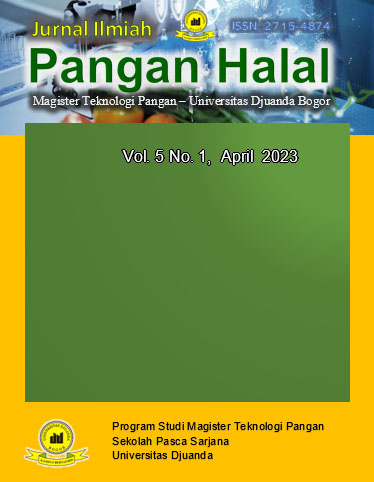Identifikasi Titik Kritis Kehalalan Bahan Nabati Dan Produk Turunan Bahan Nabati
Main Article Content
Abstract
Materials derived from plants (vegetable) are basically halal because there is no shari'a argument which specifically mentions the prohibition of the types of materials derived from plants, but if they have been processed using additives or processing aids that are not halal then the status of the product may become non-halal. . This paper uses a review of literature from various main references in the criteria for halal certification and knowledge of materials and processing of plant-based products. Identification of critical points for vegetable ingredients can be analyzed using a decision tree for identifying critical points for halal vegetable ingredients. Products derived from vegetable materials can be contaminated with unclean/unclean materials if there are additional ingredients and processing. The various processed plant food products in this article are complemented by the results of a study identifying their critical points starting from dried plant materials, wheat flour to starch and its derivatives. Vegetable ingredients are doubtful and their halal status needs to be criticized if they have undergone processing and the use of additional ingredients.
Article Details

This work is licensed under a Creative Commons Attribution-NonCommercial-ShareAlike 4.0 International License.
References
Amen, O., Jumiono, A., & Fulazzaky, M. A. (2020). Penjaminan Mutu Dan Kehalalan Produk Olahan Susu. Jurnal Ilmiah Pangan Halal, 2(1), 42-48.
Endang, S., Jumiono, A., & Akil, S. (2020). Identifikasi Titik Kritis Kehalalan Gelatin. Jurnal Ilmiah Pangan Halal, 2(1), 17-22.
Jaswir, I., Rahayu, E. A., Yuliana, N. D., & Roswiem, A. P. (2020). Daftar referensi bahan-bahan yang memiliki titik kritis halal dan substitusi bahan non-halal. Jakarta: Komite Nasional Ekonomi dan Keuangan Syariah.
Jumiono, A. (2022). Identifikasi Titik Kritis Kehalalan Bahan Hewani dan Produk Turunan Hewan. Jurnal Ilmiah Pangan Halal, 4(2), 51–58.
Jumiono, A., & Rahmawati, S. I. (2020). Kriteria Sertifikasi Halal Barang Gunaan Di Indonesia. Jurnal Ilmiah Pangan Halal, 2(1), 10-16.
LPPOM MUI. 2014. Kumpulan Fatwa MUI Bidang Pangan, Obat-obatan, Kosmetika, Ilmu Pengetahuan dan Teknologi. Penerbit LPPOM MUI. Jakarta.
LPPOM MUI. 2021. Buku HAS 23000-1 Persyaratan Sertifikasi Halal Industri Pengolahan Umum. Penerbit PT. Amanah Prima Abadi. Bogor.
LPPOM MUI. 2012, Buku HAS 23201: The Requirements of Halal Food Material. LPPOM MUI. Jakarta.
LPPOM MUI. 2022. Jus Buah Kemasan, Apa Saja Titik Kritisnya? Pada: https://halalmui.org/jus-buah-kemasan-apa-saja-titik-kritisnya/
Sunaryo, E. S., Mardiah, M., & Rahmawati, S. I. (2019). The Importance Of Halal Validation Of Ingredients As Critical Parameter During Halal Audits. Jurnal Ilmiah Pangan Halal, 1(1).
Thahir, M. (2022). Tafsir Maqasidi Ayat-Ayat Makanan Halal dan Implementasinya dalam Fatwa MUI (Studi pada Produk Pangan, Obat dan Kosmetika).
Utama, Hendra. 2022. Urgensi Daftar Bahan Tidak Kritis dalam Proses Sertifikasi Halal.https://halalmui.org/urgensi-daftar-bahan-tidak-kritis-dalam-proses-sertifikasi-halal/
Utama, Hendra. Urgensi Daftar Bahan Tidak Kritis dalam Proses Sertifikasi Halal. https://halalmui.org/urgensi-daftar-bahan-tidak-kritis-dalam-proses-sertifikasi-halal/
Widjayanti, W., Widowati, S. ., & Mardiah, M. (2022). Efektifitas Pembinaan Pemenuhan Komitmen Registrasi Pangan Segar Asal Tumbuhan (PSAT) di Kabupaten Sukabumi. Jurnal Ilmiah Pangan Halal, 4(1), 25–34.
Widowati, S. (2021). Kajian Teknologi Tepung Kasava: Prospek Dan Kendala Pemanfaatan Untuk Industri Pangan Berbasis Tepung. Jurnal Ilmiah Pangan Halal, 2(2), 79–84.
